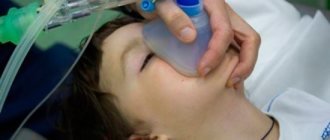Until recently, it was believed that medical anesthesia was a completely reversible condition and that as the anesthetic drugs were removed, the patient's brain returned to its original state. Memory lapses and problems with concentration, increased fatigue and irritability after surgery were attributed exclusively to symptoms of postoperative asthenic syndrome and were considered not to require special treatment. In some cases, this is indeed the case, because many patients fully recover from anesthesia and do not show any complaints.
In most cases, anesthesia is tolerated without consequences
Recent studies have shown that cognitive functions and memory after anesthesia are not spontaneously restored in everyone who has undergone this procedure. In some cases, after general intravenous or inhalational anesthesia, postoperative cognitive dysfunction (POCD) develops. In this case, patients complain of poor memory, decreased ability to concentrate and learn. In severe cases, oral or written speech is impaired, the person cannot remember the right word or rearranges the letters in words. Over time, the condition does not improve and may even worsen.
Impaired memory and attention after general anesthesia may be a manifestation of asthenic syndrome or postoperative cognitive dysfunction. If in the first case the symptoms gradually regress, then in the second, active treatment is required to stabilize the process.
What happens to the body after recovery from anesthesia?
More recently, it was believed that after surgery, when the patient was given anesthesia, his brain gradually returned to its original state. All drugs administered for anesthesia are completely eliminated from the body - this process was considered completely reversible.
Poor concentration, memory loss, fatigue and increased irritability after surgery are symptoms of postoperative syndrome. Therefore, there was no rush to treat this condition. In most cases, no claims or complaints were received from patients. They fully recovered from anesthesia.
However, scientists have conducted some studies, the results of which have shown that the restoration of memory and other cognitive functions does not occur in all patients. Some patients experience postoperative cognitive dysfunction (POCD) after intravenous or inhalational anesthesia. People begin to complain of reduced concentration, memory loss and lack of learning ability. In advanced and difficult situations, the patient cannot speak, write or change letters in words. Even after some time, the patient's condition only gets worse, not better.
Content:
- What happens to the body after recovery from anesthesia?
- How is memory impaired in asthenic syndrome?
- Occurrence and manifestation of POCD
- Memory recovery methods
Impaired memory and attention after surgery may be an asthenic syndrome. In the first case, the symptoms begin to appear gradually, and in the second (POCD), long-term therapy will be required for recovery.
Factors that increase the risk of memory impairment
The causes of intellectual impairment after anesthesia are still unclear. But scientists identify a number of factors that increase the risk of such complications. Firstly, older people are at risk for memory loss. Secondly, memory impairment is often observed in people who have undergone repeated anesthesia. Thirdly, if the operation lasted a long period of time, then the chances of memory loss increase sharply. Fourthly, infectious and respiratory complications after surgery can cause memory impairment after anesthesia.
How is memory impaired in asthenic syndrome?
Not only the operation, but also the disease itself, due to which it was performed, is considered a strong stress for the body. Tension and the depletion of its reserves can affect the development of asthenic syndrome. However, the first symptoms to appear are fatigue, insomnia, daytime sleepiness, and apathy. But memory impairment is considered a secondary manifestation after concentration is impaired.
During the tests, an imperceptible, strong memory impairment is detected. At the beginning of the study, the patient remembers everything well, but as soon as he begins to get tired, his memory is impaired. Therefore, the test results are unsatisfactory.
Therapy for this condition is as follows:
- rapid rehabilitation after eliminating the root cause of the disease;
- rejection of bad habits;
- a balanced menu, which will be dominated by nuts, olive oil, fatty fish, citrus fruits;
- daily walks outside;
- performing physical exercises;
- treatment at a resort or sanatorium, short-term tourist trips are possible.
The doctor prescribes sedatives, nootropics, and tranquilizers as medications.
However, if treatment is not prescribed, then the cognitive functions of a person and the mental processes of the body will gradually recover on their own. The timing depends on the speed of healing of the underlying disease.
central nervous system
It is the brain that is the main target of general anesthesia - turning off the central component of the perception of pain sensitivity. The effect of drugs on the central nervous system is due to changes in the magnitude of the metabolic function (basal metabolism) and blood flow in it. It is worth noting that the effect of intravenous anesthesia on the brain is completely different from the above.
Thus, inhaled drugs dilate blood vessels, increase blood flow and reduce oxygen consumption. In turn, barbiturates (intravenous anesthetics) reduce blood circulation by almost 2 times. Another general anesthesia, ketamine, on the contrary, increases both indicators.
Thus, the effect of anesthesia on the central nervous system depends on the drugs used, the initial condition of the patient, and the specific clinical situation.
Occurrence and manifestation of POCD
The first signs of postoperative cognitive dysfunction can be noticed immediately after anesthesia or within three months after it. Patients complain of deterioration of memory and speech (they cannot remember and find the necessary words during a conversation). Concentration is impaired and learning ability is reduced. The results of special tests show that memory deteriorates by more than 20% of a person’s baseline level. After some time, these changes progress.
The main causes of postoperative cognitive dysfunction are currently unknown. However, there are some assumptions, namely:
- due to the fact that blood pressure levels decrease when anesthesia is administered, an episode of transient ischemia of the cerebral cortex occurs, but subsequently blood circulation in this area is completely restored (such disturbances are similar to a micro-stroke, due to which memory is impaired after recovery from anesthesia);
- the effect of anesthesia on the balance of mediators and signaling molecules in the interneuronal space (can affect the triggering of neuronal destruction, which will lead to amnesia and loss of learning ability);
- a consequence of stimulation of the immune system and inflammation in the patient’s body, this is the body’s reaction to the surgical injury received (this is confirmed by the results of experiments on the connection between surgery and the development of POCD).
If after surgery the patient does not receive enough pain relief for pain, then the risk of developing POCD increases. Therefore, there is no need to give up the medicine, as this can only worsen the situation.
There are some factors that provoke the development of POCD, these are:
- long periods of time under general anesthesia;
- high dosage of drugs;
- extensive surgical trauma;
- elderly age of the patient;
- the patient's level of intelligence;
- poor pain relief in the postoperative period.
Brain exercises
It is not necessary to take medications to restore your previous shape. Need training. What is meant by this word? This includes:
- Math problems.
- Chess, checkers, even cards.
- Solving crossword puzzles.
- Reading and retelling what you read.
- Logical games and tasks.
The training includes everything that makes you “twist.” And this should not be neglected. Perhaps not immediately, but the training will give its results. Brain function will gradually return to normal, and maybe even get better.
Respiratory system
It is worth noting that general anesthesia affects this function not only through the central nervous system (CNS), but also through the direct relaxing effect of drugs (muscle relaxants). As a result, the mechanics of breathing change—rhythm, depth, inhalation/exhalation ratio, and mode of operation of the respiratory muscles. In this way, all links of central regulation change.
In addition, the effects of general anesthesia also affect other lung functions. For example, the level of serotonin, catecholamine and other active substances changes. The production of surfactant may be impaired. And it, a surfactant, is needed so that the walls of the alveoli (the structural unit of the lungs) do not stick together.
General anesthesia in combination with artificial ventilation changes the distribution of ventilation and blood flow in the respiratory organs. In this case, changes in the latter lead to disturbances in the distribution of the ventilation-perfusion ratio. It also inhibits the cough reflex, reduces the drainage of sputum and reduces the function of sputum evacuation from the tracheobronchial tree.
Classification
According to the standard classification, appropriate forms of anesthesia are required for different stages of the operation. The introductory stage requires rapid euthanasia, during the treatment stage maintenance anesthesia is necessary, and basic anesthesia involves a superficial shutdown, during which the amount of the main drug is reduced.
During surgical interventions, anesthesia is selected taking into account sensitivity, intensity of action and the required duration of sleep. In this regard, the following are highlighted:
- mononarcosis – one medication is required to induce sleep,
- mixed - implies the use of at least two medications of similar action,
- combined – involves the use of drugs from different groups. It is considered complex and is called multicomponent anesthesia.
An absolute contraindication to the use of anesthesia
Liver diseases
The importance of using anesthesia during surgery is undeniable. There are conditions that threaten irreversible consequences or threaten life, in which case they talk about the supposed benefits of anesthesia.
Anesthesia is prohibited for the following diseases:
- heart pathology;
- liver and kidney diseases;
- inflammatory diseases.
Before surgery, all people with heart disease must undergo a complete examination of the body. This will help the specialist assess the patient’s general condition and determine the type of anesthetic.
Memory recovery methods
If memory impairment and learning ability do not recover within three months, you should consult an experienced specialist. A neurologist deals with such issues. After the examination, he will identify the exact cause of this condition and prescribe effective treatment.
Due to the fact that the concept of postoperative cognitive dysfunction is completely new in medicine, clear diagnostic procedures and treatment methods have not yet been developed. Therefore, there is no exact answer on how exactly to cope with this condition.
This condition can be corrected with the help of nootropic drugs, neuroprotectors, antioxidants, non-steroidal anti-inflammatory drugs and dopamine agonists. Due to the fact that there is no clear algorithm for conducting therapy, the correct choice of method becomes noticeably more complicated.
In addition, the selection of drugs is carried out on an individual basis, because it depends on the patient’s age, existing diseases and symptoms of postoperative cognitive dysfunction.
To improve memory, the patient is advised to give up bad habits, strictly follow all the doctor’s recommendations and train his memory.
However, after conducting some research, scientists have found that surgery and anesthesia affect immediate memory.
Researchers from the University of Wisconsin School of Medicine and Public Health at Madison looked at people up to the age of sixty. None of the subjects suffered from memory impairment. But a couple of years after the tests were carried out, some of them underwent surgery for one reason or another. The rest did not undergo surgery. After repeated tests, immediate memory deteriorated in those who had undergone the procedure (they were unable to store information about events that had occurred in the past hours or day). Other sections of memory remained untouched.
Experts have found that brain damage after anesthesia affects only instant memory. The violations turned out to be not too serious, but doctors were still alarmed, so scientists continue to work on the problem. Today it is too early to talk about any changes in medical practice. In addition, patients do not notice any symptoms with such disorders.
Memory problems occur in 80% of patients, so the question of how to restore memory after anesthesia is very relevant. This symptom characterizes postoperative cognitive dysfunction, which is also manifested by loss of concentration and difficulty in learning. Restoring memory after anesthesia is the first concern of the patient after surgery.
Kinds
General anesthesia varies depending on the method of drug administration:
- inhalation – has several varieties. Typically, the inhaled drug is administered through a mask, but endotracheal and endobronchial methods of administering anesthesia are also used. Inhalation anesthesia is attractive because it allows you to keep the patient unconscious for a long time. It is enough to supply the drug in the required concentration in a timely manner,
- intravenous - a common method of immersion in medicated sleep. Has the least impact on health, suitable for operations performed within 20-30 minutes. For longer treatment, the drug is re-administered,
- combined - a combination of inhalation and infusion methods is necessary in especially severe cases. Combined anesthesia prolongs the operation time, but the very mixing of medications and techniques is fraught with complications. Combined exposure produces a strong reaction and threatens the development of life-threatening conditions.
How does anesthesia affect a child's memory and attention?
It has already been proven that the effect of anesthesia on the human body is extremely negative; you can learn more about this in our article. It's worst for young children. Memory loss after anesthesia is even the least of the troubles. A child is a fragile organism, it grows and develops, its neural connections in the brain are still being formed. And general long-term anesthesia can lead to inhibition of all processes in a small body. The child may begin to lag behind in development, and quite seriously. May lag behind peers by several years. Usually, then the brain catches up, the disturbance and memory loss after anesthesia also disappear, but this will take at least a year.
In any case, before giving consent to surgery under general anesthesia, parents need to know about the consequences and how to deal with them later. And for this you need a consultation with an experienced pediatric anesthesiologist.
MYTH No. 2 “There will be hallucinations.”
Often, people who underwent anesthesia in the 70-80s of the last century remember them with horror. This is due to the fact that during and after anesthesia, many of them had nightmares, hallucinations, and disturbed sleep. It was objective! All the symptoms described were a side effect of one of the anesthetics - the drug is very good in terms of its qualities in terms of pain relief and safety for the patient, but it has these features. It is possible to smooth out the negative effects of this drug by using complex anesthesia (a combination of several anesthetics).
Today, qualitatively different anesthesia drugs are widely used, which provide a soft fall asleep, smooth sleep and peaceful awakening . Very often, within the first half hour after anesthesia, the patient states that “it was as if nothing had happened...”











